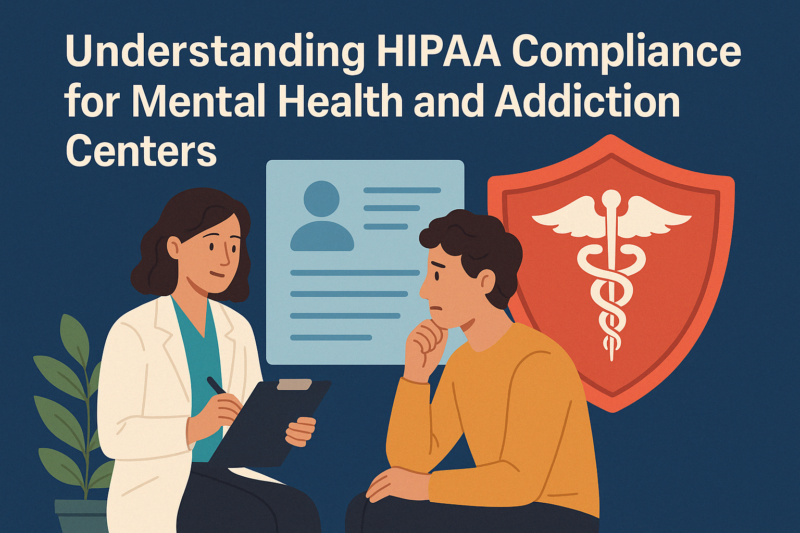HIPAA compliance for mental health and addiction centers is essential for protecting sensitive patient data, maintaining legal and ethical standards, and building trust with those seeking treatment. The Health Insurance Portability and Accountability Act (HIPAA) sets national standards for the protection of patient health information, including special provisions for mental health and substance use disorder records.
This guide outlines the key elements of HIPAA compliance, the intersection with 42 CFR Part 2, and how centers can implement effective safeguards. We’ll also cover common compliance challenges and how Lead to Recovery can support your organization through expert HIPAA compliance consulting services.

For expert support tailored to your organization, explore how our HIPAA compliance consulting services can help you implement safeguards and maintain regulatory confidence.
Why HIPAA Compliance Matters
HIPAA was enacted to safeguard protected health information (PHI), including medical histories, diagnoses, and billing data. For mental health and addiction treatment providers, this law ensures that sensitive mental health information and substance abuse records are handled with the highest level of confidentiality.
Mental health professionals, treatment providers, and healthcare organizations must balance patient privacy with the ability to provide services efficiently. HIPAA allows for information sharing under specific conditions, such as emergencies or with patient consent, while protecting patients from unauthorized disclosures.
Maintaining HIPAA compliance is not just about legal adherence—it’s about creating a safe space for people seeking treatment and reducing the stigma surrounding mental illness and substance use disorders. To explore the importance of HIPAA compliance in more detail, visit our in-depth blog post.
Core Components of HIPAA Compliance
Privacy Rule
The Privacy Rule outlines how covered entities like treatment facilities and health care providers must handle individually identifiable health information. It establishes patients’ rights over their medical records and limits disclosure.
Security Rule
The Security Rule mandates administrative, technical, and physical safeguards for electronic PHI. Centers must use encryption, access controls, and risk assessments to prevent data breaches.
Breach Notification Rule
The HIPAA Breach Notification Rule requires providers to notify patients, the Department of Health and Human Services, and in some cases the media, following a breach. Timely notification is crucial for maintaining trust and legal compliance.

Ensure your safeguards meet federal standards—speak with a HIPAA compliance consultant at Lead to Recovery for personalized guidance.
Understanding 42 CFR Part 2
42 CFR Part 2 is a federal law that applies specifically to federally assisted programs that provide substance use disorder treatment. It offers stricter standards than HIPAA for disclosing patient records related to substance abuse disorders.
- Disclosure requires written patient consent with an expiration date and recipient details.
- Exceptions exist for medical emergencies, court orders, and qualified audits.
- 2023 updates align some provisions with HIPAA but maintain strict confidentiality standards.
Facilities must comply with both HIPAA and 42 CFR Part 2. If the laws conflict, the more restrictive rule applies.
HIPAA and Patient Consent for Information Disclosure
HIPAA permits sharing of PHI for treatment, payment, and health care operations without patient authorization. However, substance use treatment providers governed by 42 CFR Part 2 must obtain written consent to disclose protected health information.
To remain compliant:
- Use standardized consent forms that detail what information is shared, with whom, and why.
- Respect patients’ rights to revoke consent.
- Disclose only the minimum necessary information.
Our HIPAA consulting team helps mental health and addiction centers build and implement consent protocols that align with federal and state rehab compliance requirements.
Managing HIPAA Business Associates and QSOs
Business associates and qualified service organizations (QSOs) are third parties that support health care services and handle PHI. Common examples include billing vendors, IT providers, and labs.
- Require signed Business Associate Agreements (BAAs) that outline compliance obligations.
- Ensure vendors are trained on HIPAA rules and privacy regulations.
QSOs must also follow 42 CFR Part 2 when supporting addiction treatment centers. Lead to Recovery can help audit and manage these relationships.
Responding to Breaches and Penalties
Violating HIPAA or 42 CFR Part 2 can result in:
- Civil penalties (based on severity and negligence)
- Criminal charges (e.g., intentional misuse of PHI)
- Mandatory corrective action plans
HIPAA applies to health plans, providers, and business associates, while 42 CFR Part 2 applies to programs receiving federal funding or otherwise indirectly assisted by the federal government.
If a breach occurs:
- Conduct a breach risk assessment
- Notify affected individuals and regulators per the breach notification rule
- Update internal policies and training as needed
Need help preparing for an audit or responding to a breach? Fill out our contact form or dial 855-876-7238.
Common Compliance Challenges
- Inadequate staff training
- Lack of encryption or outdated IT systems
- Poor documentation of patient records regulations
- Misunderstanding distinctions between HIPAA and 42 CFR Part 2
Many mental health facilities and small providers lack internal compliance teams. That’s where Lead to Recovery offers consulting tailored to your facility’s size and scope.
Build a Strong Compliance Program
A strong HIPAA and Part 2 compliance program should include:
- Written privacy and security policies
- Regular staff training
- Routine risk assessments and internal audits
- Documentation and reporting procedures
- Protocols for patient rights and complaints
Our team offers tools for quality assessment, staff onboarding, and operational planning—all aligned with national standards.
Frequently Asked Questions
Before building or upgrading your compliance program, it’s helpful to understand a few key regulations and common concerns. Below are answers to some frequently asked questions about HIPAA and 42 CFR Part 2.
What’s the difference between HIPAA and 42 CFR Part 2?
HIPAA provides general privacy protections for health information, while 42 CFR Part 2 imposes stricter confidentiality rules specifically for substance use disorder treatment records.
Who needs to sign a Business Associate Agreement (BAA)?
Any third-party vendor or service provider that accesses protected health information (PHI) on behalf of a covered entity must sign a BAA under HIPAA regulations.
What happens if a rehab center violates HIPAA?
Violations can result in civil penalties, criminal charges, and mandatory corrective action plans, depending on the severity and intent behind the breach.
Protect Your Patients and Your Facility
Achieving HIPAA compliance for mental health and addiction centers isn’t just a legal necessity—it’s a commitment to ethical, safe, and effective care. With the added complexity of confidentiality of substance use treatment records, it’s essential to take a proactive approach.
Whether you’re launching a new treatment facility or upgrading systems at an existing one, Lead to Recovery helps you simplify compliance while improving operational efficiency.
Take action today by scheduling HIPAA compliance consulting—call 855-876-7238 to speak with a Lead to Recovery expert.
Once compliance measures are in place, partnering with a mental health marketing agency ensures your outreach efforts build trust while adhering to all regulations.

Content written by rehab marketing expert Matthew Travers
Co-Founder
Matthew Travers is a seasoned digital marketing leader with 22 years of experience, including the last decade dedicated to addiction treatment and mental health marketing. He is passionate about developing impactful strategies that combine deep expertise in SEO and conversion rate optimization with a focus on aligning business goals to innovative, results-driven solutions.

